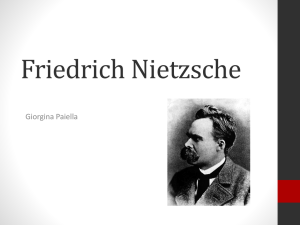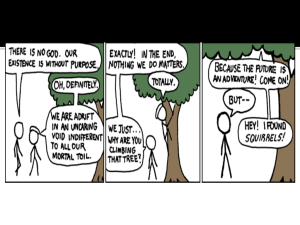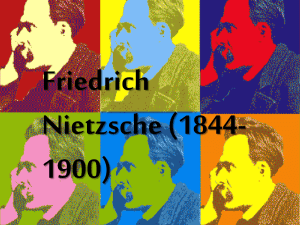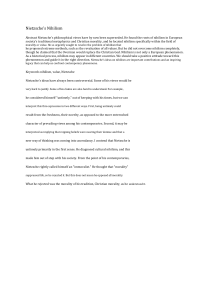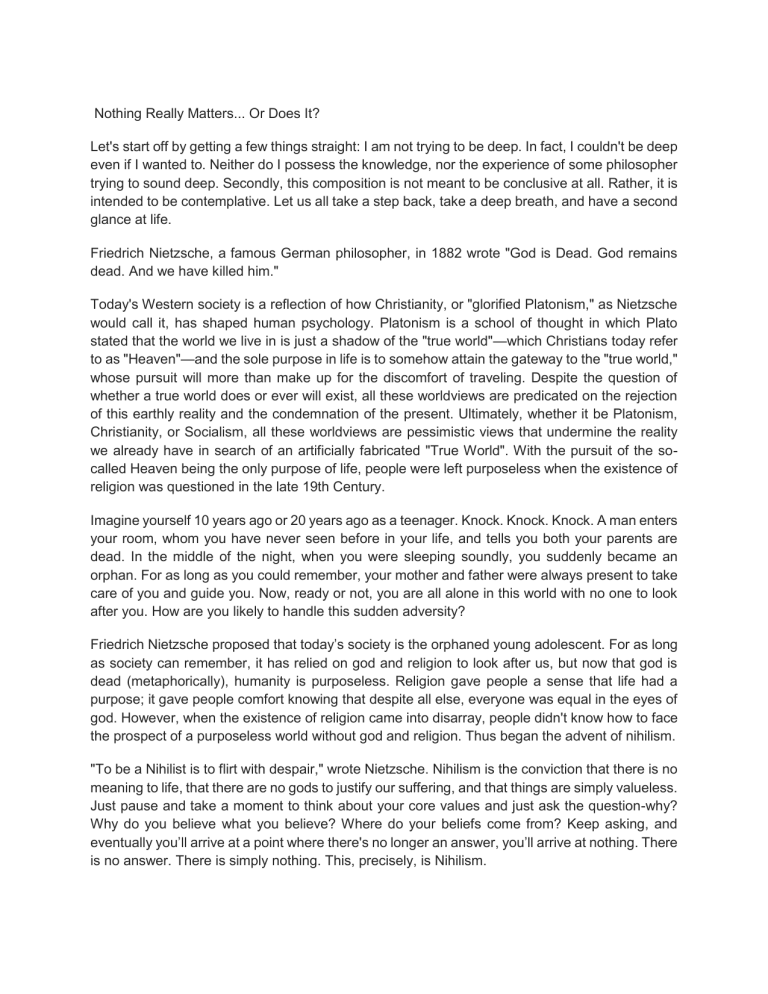
Nothing Really Matters... Or Does It? Let's start off by getting a few things straight: I am not trying to be deep. In fact, I couldn't be deep even if I wanted to. Neither do I possess the knowledge, nor the experience of some philosopher trying to sound deep. Secondly, this composition is not meant to be conclusive at all. Rather, it is intended to be contemplative. Let us all take a step back, take a deep breath, and have a second glance at life. Friedrich Nietzsche, a famous German philosopher, in 1882 wrote "God is Dead. God remains dead. And we have killed him." Today's Western society is a reflection of how Christianity, or "glorified Platonism," as Nietzsche would call it, has shaped human psychology. Platonism is a school of thought in which Plato stated that the world we live in is just a shadow of the "true world"—which Christians today refer to as "Heaven"—and the sole purpose in life is to somehow attain the gateway to the "true world," whose pursuit will more than make up for the discomfort of traveling. Despite the question of whether a true world does or ever will exist, all these worldviews are predicated on the rejection of this earthly reality and the condemnation of the present. Ultimately, whether it be Platonism, Christianity, or Socialism, all these worldviews are pessimistic views that undermine the reality we already have in search of an artificially fabricated "True World". With the pursuit of the socalled Heaven being the only purpose of life, people were left purposeless when the existence of religion was questioned in the late 19th Century. Imagine yourself 10 years ago or 20 years ago as a teenager. Knock. Knock. Knock. A man enters your room, whom you have never seen before in your life, and tells you both your parents are dead. In the middle of the night, when you were sleeping soundly, you suddenly became an orphan. For as long as you could remember, your mother and father were always present to take care of you and guide you. Now, ready or not, you are all alone in this world with no one to look after you. How are you likely to handle this sudden adversity? Friedrich Nietzsche proposed that today’s society is the orphaned young adolescent. For as long as society can remember, it has relied on god and religion to look after us, but now that god is dead (metaphorically), humanity is purposeless. Religion gave people a sense that life had a purpose; it gave people comfort knowing that despite all else, everyone was equal in the eyes of god. However, when the existence of religion came into disarray, people didn't know how to face the prospect of a purposeless world without god and religion. Thus began the advent of nihilism. "To be a Nihilist is to flirt with despair," wrote Nietzsche. Nihilism is the conviction that there is no meaning to life, that there are no gods to justify our suffering, and that things are simply valueless. Just pause and take a moment to think about your core values and just ask the question-why? Why do you believe what you believe? Where do your beliefs come from? Keep asking, and eventually you’ll arrive at a point where there's no longer an answer, you’ll arrive at nothing. There is no answer. There is simply nothing. This, precisely, is Nihilism. Nihilists do not believe in anything. They don't believe that there is evil in this world, nor do they believe that there is good in this world. The world simply is—and no more. Let’s take the glass cup analogy as an example. An optimist would say that the glass is half full, while a pessimist would say that the glass is half empty. A Nihilist? He would throw the entire cup away, because what does it matter whether it's full or empty? Full, empty, justice, evil—it’s all irrelevant; we’re all going to die anyway. Think about it for a minute, if life truly has no meaning and everything that we've done till now has no value, then all these acts of justice, the generous things we've done, helping others in need, from slavery to human rights movements, look at how far we've come, and then think about the fact that it all might just be a waste, a blip in time with no consequences whatsoever. Insignificant in the billions of years the universe has existed. Knowing that all the things we go through—the highs and the lows—are all for nothing. Nothing really matters. At least that’s what the Nihilists seem to think. Although many people label Nietzsche as an advocate of Nihilism right off the bat, he made some significant arguments against the principles of Nihilism. It goes something like this: If you believe in nothing, then that NOTHING becomes SOMETHING that you believe in. But since you now believe in SOMETHING, there is no nihilism because it is the belief that there is nothing. Therefore, nihilism destroys itself. Take a moment to think about life. If nothing matters and we are just a random combination of gases and molecules, how can we ever truly say that things like slavery and the Holocaust were actually bad? How can we tell objectively that Hitler was one of the worst humans to ever exist for trying to wipe out an entire race? On the contrary, why are people like Gandhi or Mother Teresa automatically categorized as saints? Why is one who blatantly ended millions of human lives the incarnation of evil while those who saved millions are regarded as saints? Why, if human life is so meaningless, is it a mechanism to separate between good and evil—a concept so vague yet crucial for the existence of human life. If humans stop believing in something bigger than themselves, society will crumble. Religion no longer holds any say in what is morally acceptable, people are destroying long standing beliefs and cultural practices and calling themselves "woke." In today’s modern society, anything, no matter how repulsive you find it, now has a loyal cult defending why they have a right to do whatever it is that they want to do. And to be honest, WHY NOT? We will keep shifting the needle of our moral compass ever so slightly until one day none of us will be able to tell the other that they are wrong, because "Why are they wrong?" Abstract concepts like good, bad, evil, justice, morality, ethics, and many more acted as pillars that supported human civilization throughout the years. However, Nihilists completely rejecting these values will lead to a plunderous and chaotic society, which is—for the sake of simplicity—bad. So nihilism is not the answer. However, if there is truly no meaning to life and there is no "True World" after death, then what? If life is inherently meaningless, we might as well figure out how to make the most of our meaningless existence. You don't have to be happy for the sake of the universe or for the bigger picture. Heck, if you died right now or were never born, it would not make a single difference in this unfathomably large, fourteen-billion-year-old universe. I mean, if your existence won't make any difference whatsoever, wouldn't it make more sense to go through life happily rather than being all sad and depressed? Well, that is all I wanted to say. I was hoping for something more fluid than this debris of ideas you have before you. It is what it is—nothing really matters, right? I just wanted to end by saying something optimistic: "Life is reason enough for living."

